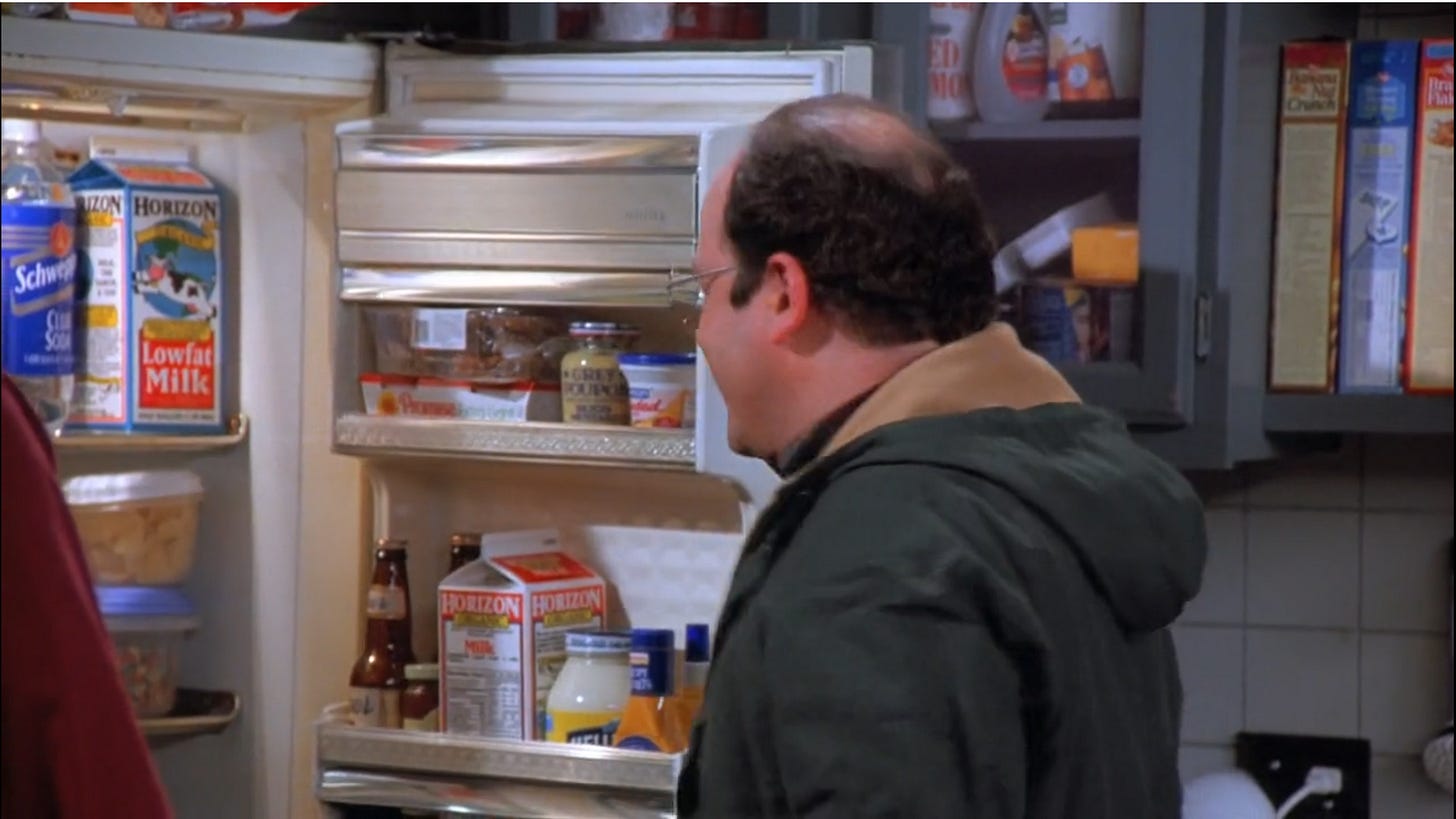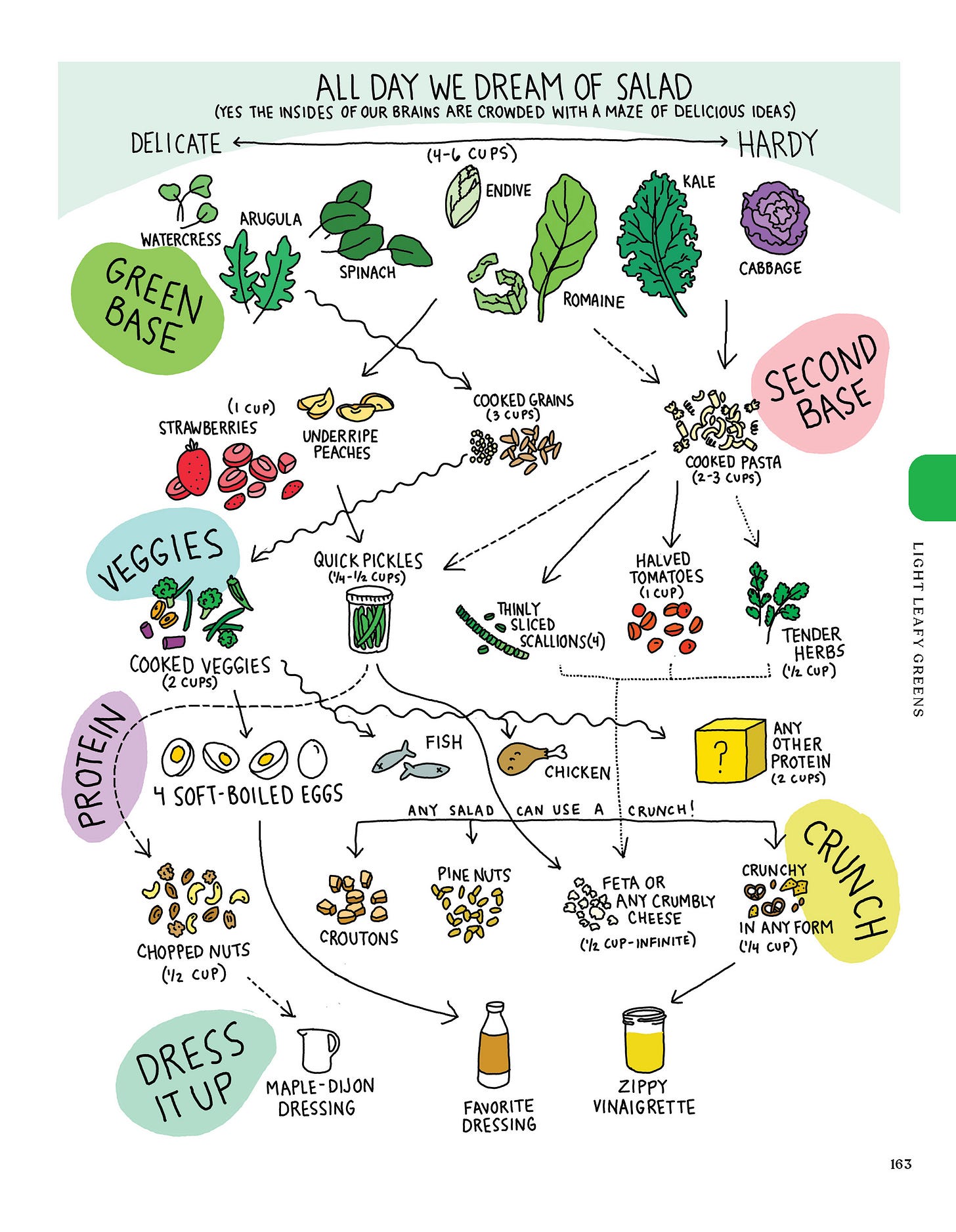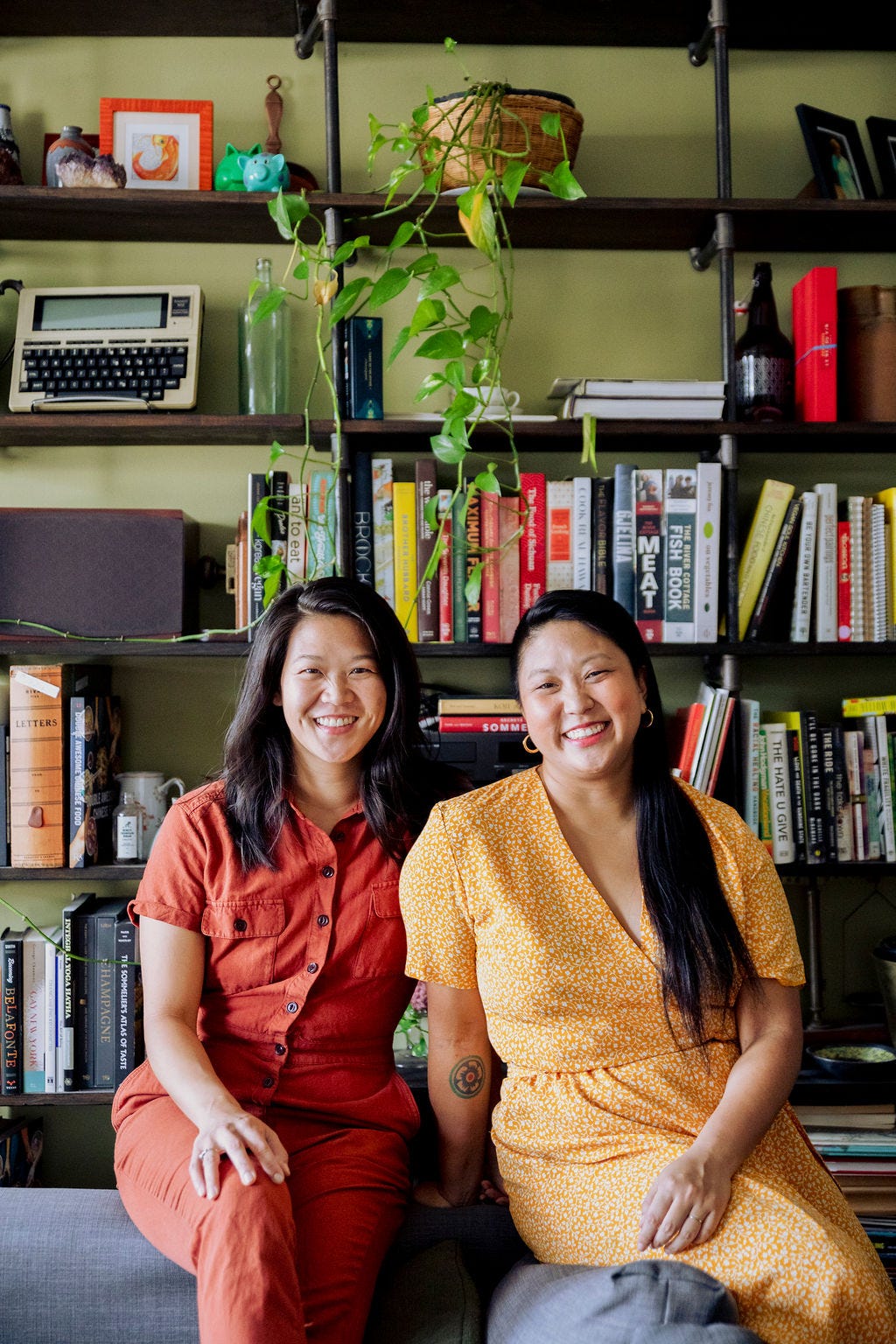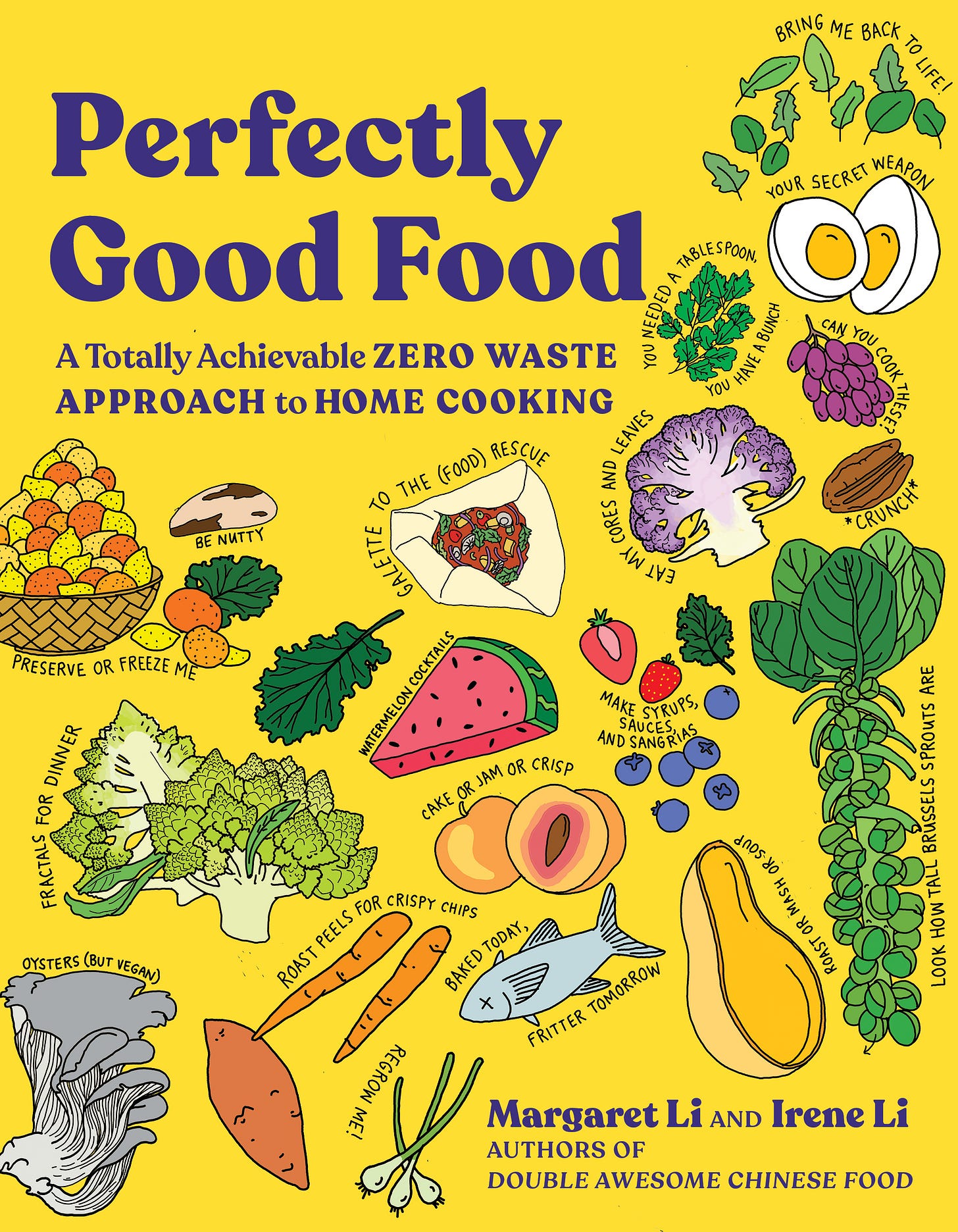Refrigerator Glow Ups Never Tasted So Good
The new cookbook reframing your about-to-go-off produce from waste into deliciously creative innovation.
Welcome back to The Link, a bi-weekly circularity newsletter making the connection between regenerative farming and you, every other Tuesday.
Do you remember that Seinfeld episode, “The Frogger,” where Elaine totally loses it because of the annoying co-workers who keep having in-office birthdays and gross sheet cake, so much so that she calls in sick to get away from it all? The aggressively friendly colleagues even surprise her the next day with a cake of her own. Pissed off, she refuses a slice, only to suffer the crippling pang of 3pm sugar cravings. Desperation lures her to raid her boss’s fridge, where she devours a 60-year-old piece of cake from King Edward VIII's wedding to Wallis Simpson. Peterman, her boss, bought it for $29,000 at auction to be able to stare at it forever or something, and well, even though it tasted like cardboard, Elaine was unintentionally doing the thing so many of us should be doing more of at home (minus the $29,000 price tag).

The average American family of four tosses $30 of edible food in the trash/week, or $1,500 worth annually, when they could be using those potential savings towards better things, like front row seats at Beyoncés Renaissance World Tour. As a nation, we’re literally throwing away $400 billion of the food system—from the growing, processing, packaging, distribution, and selling of food items that no one will ever eat—straight into the garbage. That’s almost 40% of the food produced in the US and almost ⅓ of wasted food around the world, and yet an estimated ten percent of American households are food insecure. So when you zoom out to see that the food system is responsible for 32% of global greenhouse emissions, doesn’t it make you want to smoke a cigarette or pretend to vape on a pencil and pretend to be a vaudeville character?
If you’re reading this in an Elaine voice in your head rn like “I know, I know, we’ve got a shit ton of work to do in every step of the food chain, but I want to eat cake,” I empathize with your sugar cravings, but a shocking amount of it is taking place in all of our fridges right now. Makes me shudder just thinking about it, or thinking about putting my head in the freezer, but I’ll save that for a different newsletter. Higher income US households are the largest source of food waste, with about 37% of the uneaten food that goes straight to the landfill. And if you’re one of them (I am certainly guilty of it more than I would like to admit), there’s also all of the resources that went into that wilting bag of lettuce to consider, from the water, to the farmland and the labor that went into producing it.
But hey: I know and recognize that you probably opened this newsletter for the Seinfeld references, so hold onto your guzzler hardhats. It’s about to be a (non-office) party, I promise. That’s where the brilliant Li sisters—Margaret and Irene—have come in to infuse new ideas and mindset shifts for us all standing in front of the icebox at midnight. They've been busy as hell over the past decade, running a delicious food truck turned restaurant and dumpling company, Mei Mei, in Boston, writing cookbooks (order Double Awesome Chinese Food asap if you don’t have it) and working towards a more sustainable food system. Margaret Li founded Food Waste Feast a few years back, a site dedicated to helping home cooks get more creative in the kitchen. The polymath sisters have just come out with one of the best cookbooks of 2023, Perfectly Good Food: A Totally Achievable Zero Waste Approach to Home Cooking and I’m completely obsessed with it.
After the success of their first cookbook, Double Awesome Chinese Food, in 2018, they were both struck by how the publishing industry asks cookbook writers to think about recipes. According to Irene, all too often recipes might call for one tablespoon of specific chopped herbs. “We wondered: Could we make cooking at home more acceptable if we thought about other ways to use ingredients, substitutions, and not making so many trips to the store?”
The new cookbook guiding principles were born out of that question. With a table of contents that Irene describes as more of a “field guide” than a set of recipe chapters, she recommends using it while you’re standing in front of the fridge to pick out ingredients that need to be used before they go off to impart a sense of intuitive cooking. From strategic ways to reorganize where you place produce in the fridge (hint: put the things that will go off quickly at eye level) to a wacky salad matrix that will inspire you to skip Sweetgreen altogether, or my personal favorite (for all the lushes out there)—how to make delicious cocktails with fruit that’s about to go off, using the cookbook genuinely has made me feel refreshed and excited to cook even when I don’t feel like cooking. It’s kinda like Sister Corita Kent’s art school rules. You gotta have some guidelines to be able to break open into new creative pathways.

Gone are the days of incubating penicillin on my kitchen counter and instead, resourceful new approaches to using up my citrus (pickling the stuff, freezing it, throwing it in a salad) feel like an absolute glow up instead of existential dread. And I know how much the daily George Costanza that resides in all of us is constantly battling the overwhelming sense of climate anxiety right now as we step into the Anthropocene era as we stare into the abyss of the milk carton before work.
In North America, we’ve been trained to shop for groceries maybe once or twice a week whereas in other cultures, communities' cadence of shopping might be more frequent based on their relationship or geographical access to farms and markets. For Irene Li, the cookbook is also a nod to getting back to ancestral roots on resourceful cooking. “In many parts of the world, this book would just be considered a cookbook instead of ‘zero waste cooking'.”
Once you pick up the cookbook, the question of whether there is such a thing as food waste will keep flying around your mind like a fruit fly because the results are absolutely delicious. For Irene, the term “food waste” is a buzz phrase. “We’re hoping for people to experience a sense of satisfaction from using everything that you get at the store in using the cookbook. That and a lot of fun using it in the face of all these big existential challenges in the world.”
And hey, if you don’t like the results, Irene says “you can eat the evidence.” Guilty as charged.
Order your copy of Perfectly Good Food: A Totally Achievable Zero Waste Approach to Home Cooking from your favorite bookstore and visit Mei Mei the next time you’re in Boston.
Oh hey! You’re still reading this? If you have future topics, smart humans, or concepts you’d like to see featured, respond to this newsletter or drop me a line and say hey: Helen@HelenHollyman.com.





